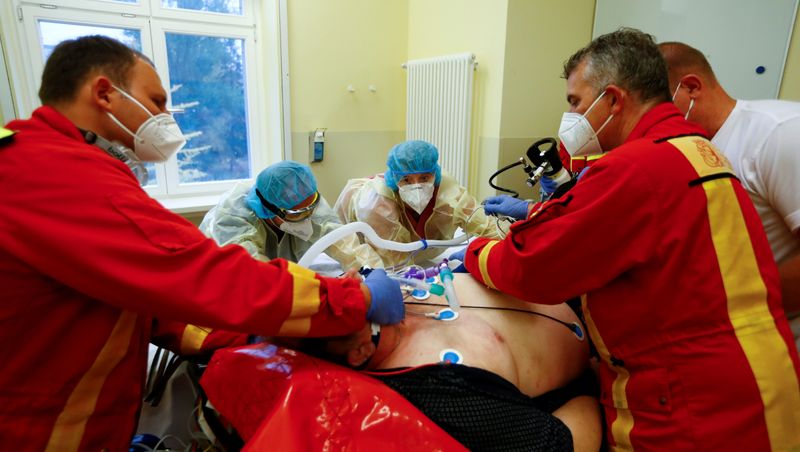MADRID (Reuters) – When six-year-old Ainara Fuertes was in pain with an ear infection late last year, her parents wanted to take her to an emergency room at their local public hospital in the Madrid suburb of Valdeolmos-Alalpardo.
Because of the coronavirus pandemic, the hospital was only seeing non-COVID patients two days a week, so they had to make do with a remote consultation.
Ainara has since recovered, but her parents Diana and Javier decided, like hundreds of thousands of people across western Europe, to sign up for private health insurance to complement state coverage.
“The hospital we depend on is overwhelmed with COVID patients and we want to have more options,” said Diana, 40.
In Spain alone, almost 470,000 people signed up to health policies last year, a 47% increase from 2019.
In neighbouring Portugal, Pedro Leitao, 44, has taken out private health insurance for his 84-year-old mother, who suffered internal bleeding last November and was taken to a crammed non-COVID emergency room at a public hospital in Lisbon.
“Public hospitals are overcrowded … and the risk of infection in the emergency room is enormous,” he said. “I’d be irresponsible if I didn’t buy health insurance for my mother.”
Frank Calderon, head of the health division at Spain’s largest insurer Mapfre, whose policy the Fuertes family picked, said most new clients were families with small children.
“People are looking for flexibility and choice,” he said.
In France, where industry-wide data for 2020 are not available yet, the insurer AXA said last week that its revenue from health insurance rose 6%, while overall sales fell 4%.
And in Germany, the number of private health insurance policies rose 1.8% to 36 million last year, helping to boost premium income by 3.8% to 42.6 billion euros.
PANDEMIC PAIN
In fact, health insurance has been one of the few silver linings from the pandemic for Europe’s insurers.
Overall premium income has slumped along with customers’ earnings, while claims related to the pandemic, as well as a huge crop of natural disasters, have soared into the hundreds of billions of euros, with more to come.
In Portugal, total premium income fell 18.7% to 9.9 billion euros in 2020, with life insurance premiums down 50% – but health insurance income rose 8.3% to a record 949 million euros, according to the ASF insurance supervisory authority.
In Spain, health insurance premiums rose 5.1% even as overall premiums fell 8.3%, dragged down by the life, automotive and corporate sectors, the industry group UNESPA said.
“Private hospitals complement the needs of part of the population, especially in times of crisis when demand is putting great pressure on public hospitals,” said Pedro Carvalho, chief executive officer at Tranquilidade, Portugal’s second-largest insurer by premiums and a unit of Italy’s Generali. Even as the pandemic recedes thanks to vaccination, insurers see more health business coming their way, not least because public hospitals will have a huge backlog of treatments and operations that were postponed because of the pandemic.
“There is nothing to suggest that the current growth situation won’t continue, at least in the coming years,” ASF said.
(Reporting by Inti Landauro and by Sergio Goncalves in Lisbon and Tom Sims in Frankfurt; editing by Andrei Khalip and Kevin Liffey)

























